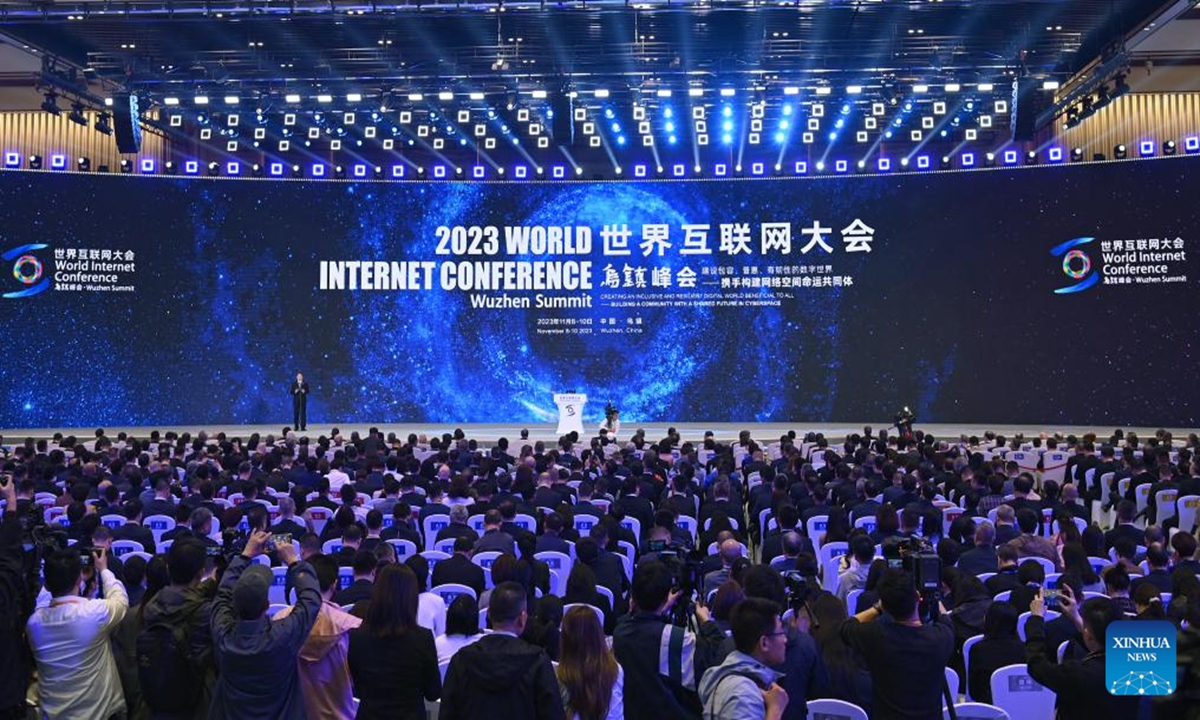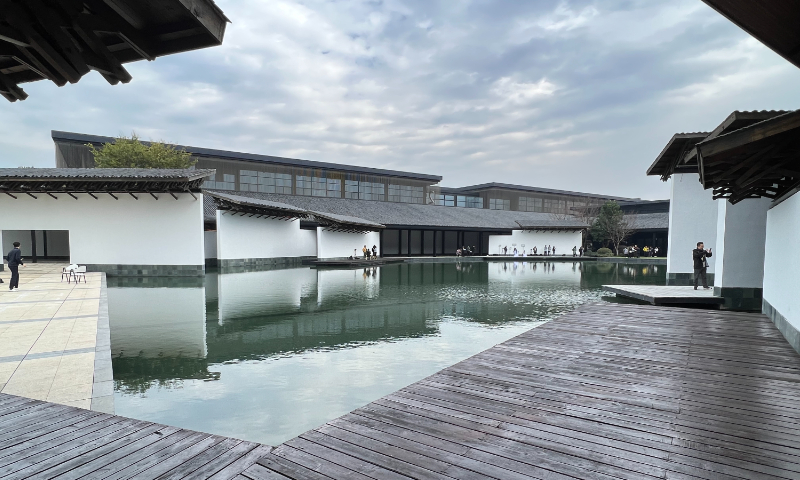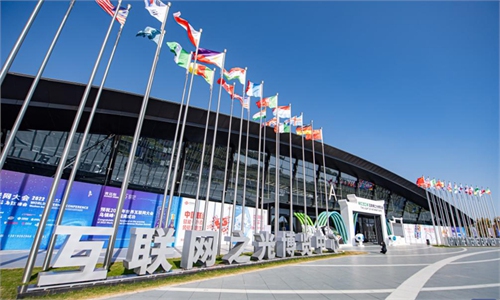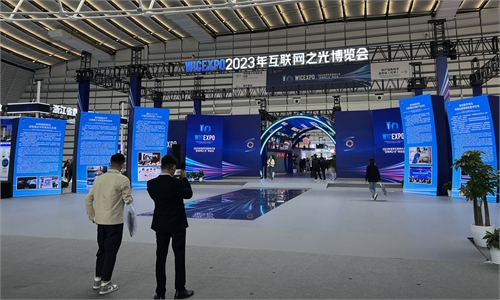ChatGPT leads Chinese firms by 1-1.5 years, but inferior in application innovation: industry insiders

The 2023 World Internet Conference (WIC) Wuzhen Summit opens in Wuzhen, east China's Zhejiang Province, Nov. 8, 2023. Photo: Xinhua
It drew a lot of attention when Zhou Hongyi, the founder and chairman of 360 Security Technology, stood with a "digital Zhou Hongyi" on the sidelines of the 2023 World Internet Conference (WIC) Wuzhen Summit, which was held on November 8-10 in Wuzhen township, East China's Zhejiang Province.
"Who is your favorite actress?" Zhou asked his digital counterpart. And the "digital Zhou" gave a near-perfect and well-balanced answer.
"As a spokesperson of Zhou, I don't have a preference for an actress, but I think there are a lot of charming and wonderful women who have achieved a lot in their careers… I also think that all women should be respected and equally treated, and we shall encourage more women to levy their talents and endeavors to make greater contributions to the society," the digital Zhou said, who has been trained using numerous large artificial intelligence (AI) models.
Digital Zhou's answer won "him" warm applauses from packed of visitors and reporters.
The response is a vivid display on the prowess of Chinese generative AI, an industry on a meteoric rise this year since ChatGPT, developed by Open AI, fired the starting gun at the global race. It nevertheless also points to one of the future directions which digital human, or in the broad scope - generative AI - should be developed: To better mimic the feeling and speaking style of real human beings.

A view of the 2023 World Internet Conference Wuzhen Summit in Wuzhen, East China's Zhejiang Province, on November 10, 2023 Photo: Li Xuanmin/GT
Cutting-edge AIGC on show
Last week, Open AI unveiled an improved version of GPT-4 model, GPT-4 Turbo, which allows users to access personalized tasks like teaching math or designing stickers. ChatGPT, first launched in November 2022, now has 100 million weekly active users.
On the riverside of the ancient town, the applications of AI algorithms and upgraded AI generated-content (AIGC) products, developed by Chinese tech behemoths, are in the limelight at the 2023 WIC's exhibition hall, a side event of the summit.
Chinese tech giant Baidu showcased its knowledge-enhanced big language model technology Ernie Bot at its booth. Baidu was the first Chinese tech firm to debut an AI product in March to rival ChatGPT.
Wang Haifeng, Baidu's chief financial officer, told the Global Times on Thursday that the company released Ernie model 4.0 in October, which in synergy with its AI deep learning platform PaddlePaddle could elevate the efficiency of training algorithm by 3.6 times compared with the first edition, and its reasoning ability by 50 times. Since its opening to the public in August, Ernie Bot now has more than 70 million users and has developed 4,300 application scenarios, Wang disclosed.
Another Chinese tech company iFlytek, known for its voice recognition technology, also put its "Spark" 3.0 AI model on show. Xu Jiajia, a vice president of iFlytek, said that the newly released model has achieved its target of competing with ChatGPT set at the beginning of the year, that is to surpass the US-developed AI model in Chinese language ability while having comparable English language ability.
"We have set a target to be comparable with GPT-4 in most fronts in the first half of 2024," Xu said. Users of the Spark AI model has surpassed 12 million.
Open AI still leads the global competition in terms of "the intelligence of big model training and ability to process multiple models simultaneously," said Zhou from 360 Security Technology. He estimated that the technological gap between Chinese firms and Open AI is about "one to one and half years."
Zhou's company also launched its AI model "Zhinao." According to Zhou, the company, in the next step, will focus on embedding its AI model into various scenes, such as making internet search more interactive and AI-driven as well as making users able to create AI model-based application and intelligent framework.
"I think the genuine global competition has just begun. The big model is there, the training methods are there, the open source is there… ChatGPT may lead in its technology, but in terms of intelligent and customized orientation, China could create more innovation in application scenarios," Zhou said.
With the improvement in China's research and development, as well as the multiple homegrown technological breakthroughs, the divergence between Chinese and foreign companies in terms of AI technologies in both foundation and core technological dimensions would be further reduced, Wang noted.

A concept photo of AI Photo: VCG
Great significance
Wang stressed that the fast-lane development of generative AI carries great significance in releasing Chinese economic potential. "It will empower thousands of industries, prompting China's digitalization tide to further transform into intelligent streak."
Guo Kaitian, a senior vice president of Tencent, told the Global Times that Tencent Cloud has provided more than 50 big model solutions to 10 industries including finance, travel and culture as well as education.
The 2023 WIC on Thursday issued the "Developing Responsible Generative Artificial Intelligence (AI) Research Paper and Consensus," summarizing the development of global generative AI to date as well as opportunities and risks brought by the emerging technology. The report cited a prediction by McKinsey & Co that generative AI could increase global GDP by $2.6 trillion to $4.4 trillion.
It also took note of a number of challenges in security and ethics associated with generative AI, calling for more global collaboration in AI regulation.
Zhou also stressed the necessity to set a "security fence" on the technology for its long-term sound development. "There are both temporary issues, like cyberspace attack and model loopholes which are relatively easy to address, and long-term problems associated with the application of AI, such as abusing the technology for evil use and hallucination," he explained.
The ultimate security challenge brought by generative AI is deeply related to the Chinese proposal on "building a community with a shared future in cyberspace," Zhou added. And this year's Wuzhen Summit has provided an international platform for the coordination in AI-related issues.
China is a leading player in drafting AI regulations. The country has rolled out multiple measures this year that coordinated the sound development of the AI sector while safeguarding national security. It also launched the Global AI Governance Initiative in October, stressing fairness and nondiscrimination in AI development.



